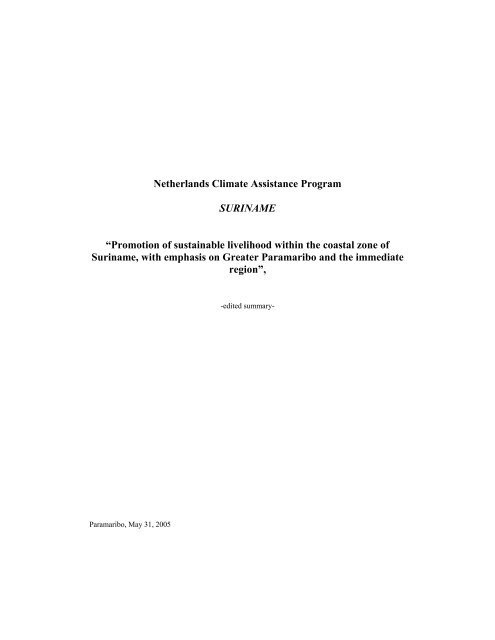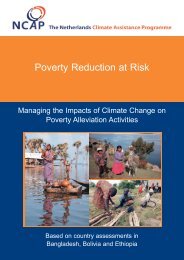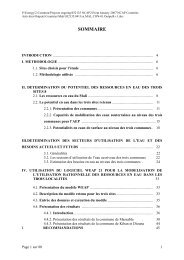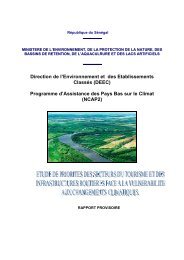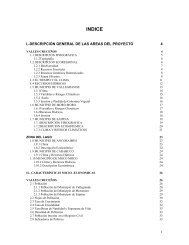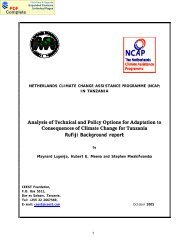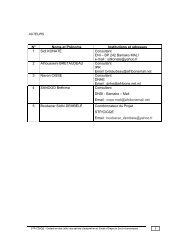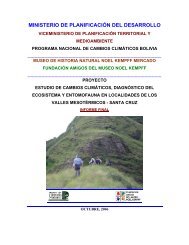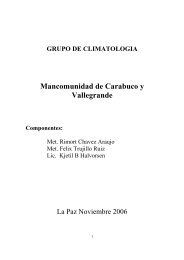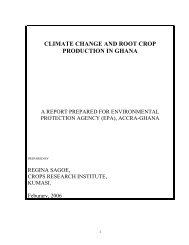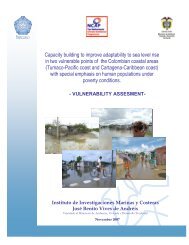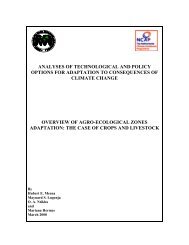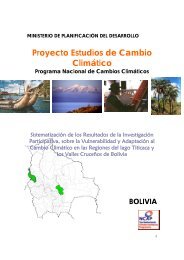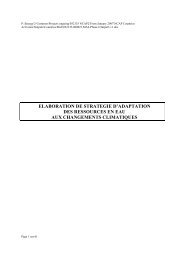Promotion of sustainable livelihood within the coastal zone ... - NCAP
Promotion of sustainable livelihood within the coastal zone ... - NCAP
Promotion of sustainable livelihood within the coastal zone ... - NCAP
You also want an ePaper? Increase the reach of your titles
YUMPU automatically turns print PDFs into web optimized ePapers that Google loves.
Ne<strong>the</strong>rlands Climate Assistance Program<br />
SURINAME<br />
“<strong>Promotion</strong> <strong>of</strong> <strong>sustainable</strong> <strong>livelihood</strong> <strong>within</strong> <strong>the</strong> <strong>coastal</strong> <strong>zone</strong> <strong>of</strong><br />
Suriname, with emphasis on Greater Paramaribo and <strong>the</strong> immediate<br />
region”,<br />
-edited summary-<br />
Paramaribo, May 31, 2005
Project Name : Ne<strong>the</strong>rlands Climate Assistance Programme<br />
Location<br />
: Suriname<br />
Duration : 31 May 2005 – 30 Nov. 2006<br />
Contractor : Ministry <strong>of</strong> Labour, Technological Development and Environment,<br />
Wagenwegstraat 22, Paramaribo, Suriname<br />
Contact person : Mrs. Margret Kerkh<strong>of</strong>fs -Zerp (Policy Maker/ Environment<br />
Section)<br />
Ministry <strong>of</strong> Labour, Technological Development and<br />
Environment,<br />
Envioronment Section, Heerenstraat 40, 3 rd floor , Paramaribo<br />
Suriname<br />
Tel. (597) 475368<br />
Fax (597) 410465/ 420960<br />
e-mail milieu_atm@yahoo.com/ maggyz21@hotmail.com /<br />
Project coordinator<br />
arbeid@sr.net<br />
: Dr. Sieuwnath Naipal<br />
Anton de Kom University <strong>of</strong> Suriname, Paramaribo<br />
Tel. (597) 465558 ext. 351; Mob. 8871-5714<br />
Fax (597) 495005<br />
e-mail naipals@yahoo.com, s.naipal@uvs.edu<br />
Page 2 <strong>of</strong> 17<br />
<strong>NCAP</strong> workplan Suriname summary.01.300106.doc
Project Summary<br />
The project encompasses:<br />
<strong>Promotion</strong> and streng<strong>the</strong>ning <strong>sustainable</strong> <strong>livelihood</strong> <strong>within</strong> <strong>the</strong> <strong>coastal</strong> <strong>zone</strong> with <strong>the</strong><br />
emphasis on:<br />
a. Climate related hazard<br />
b. Sensitivity <strong>of</strong> <strong>the</strong> <strong>coastal</strong> environment to small anthropogenic and physical<br />
changes<br />
c. Contribution to <strong>the</strong> formulation <strong>of</strong> national policy and planning<br />
d. Development and identification adaptation measure(s), to address <strong>the</strong> adverse<br />
impacts <strong>of</strong> Climate Change for <strong>the</strong> districts Greater Paramaribo and Wanica<br />
and to analyze its possible effects and feasibility<br />
e. Specification <strong>of</strong> <strong>the</strong> necessary financial need for adaptation and identification<br />
<strong>of</strong> potential (international) financial resources<br />
f. Capacity building<br />
g. Raising Awareness<br />
h. Knowledge transfer and capacity building.<br />
The project will last for 18 months and will be executed by local consultants and<br />
experts. Technical assistance will be provided by <strong>the</strong> ETC International to <strong>the</strong> local<br />
consultants. The project development will be monitored by a Climate Change Steering<br />
Committee (CCSC) established in March 2005, just after <strong>the</strong> signing <strong>of</strong> <strong>the</strong> contract.<br />
During this period <strong>the</strong> logframe is discussed and adopted by <strong>the</strong> CCSC.<br />
Rationale for <strong>the</strong> Study<br />
Suriname was one <strong>of</strong> <strong>the</strong> 13 countries, involved in <strong>the</strong> execution <strong>of</strong> <strong>the</strong> first phase <strong>of</strong><br />
<strong>the</strong> Ne<strong>the</strong>rlands Climate Change Studies Assistance Program, phase 1 (NCCSAP1).<br />
During this project <strong>the</strong> emphasis was on <strong>the</strong> determination <strong>of</strong> <strong>the</strong> impacts <strong>of</strong> <strong>the</strong> sea<br />
level rise on <strong>the</strong> <strong>coastal</strong> <strong>zone</strong>. In this study it was concluded that large areas <strong>of</strong><br />
Suriname’s <strong>coastal</strong> <strong>zone</strong> are very vulnerable to sea level rise, in particular Greater<br />
Paramaribo. Losses will be huge if no protection measures will be taken. A mixed<br />
feasible measure was mentioned but not elaborated. Also <strong>the</strong> pilot study, which is part<br />
<strong>of</strong> <strong>the</strong> project, never came to its execution. In this way <strong>the</strong> final conclusions and<br />
recommendations found at <strong>the</strong> end <strong>of</strong> <strong>the</strong> NCCSAP1 project did not got <strong>the</strong> necessary<br />
attention. However, some recommendations that came out <strong>of</strong> <strong>the</strong> project are reflected<br />
in <strong>the</strong> present policy formulation <strong>of</strong> <strong>the</strong> government.<br />
A second phase <strong>of</strong> <strong>the</strong> project execution is <strong>the</strong>refore proposed and adopted as <strong>NCAP</strong>2.<br />
The outcomes <strong>of</strong> <strong>the</strong> NCCSAP1 and that <strong>of</strong> <strong>the</strong> First National Communication provide<br />
most <strong>of</strong> <strong>the</strong> key inputs towards <strong>the</strong> decisions to elaborate <strong>the</strong> protection measure and<br />
to rise awareness and <strong>livelihood</strong> in <strong>the</strong> <strong>coastal</strong> <strong>zone</strong> <strong>of</strong> <strong>the</strong> country, and that <strong>of</strong> <strong>the</strong><br />
districts Paramaribo and Wanica.<br />
The general goals and its methodology were first discussed with <strong>the</strong> <strong>NCAP</strong>2 team in<br />
<strong>the</strong> Ne<strong>the</strong>rlands during <strong>the</strong> Winter Workshop early this year and finally discussed<br />
<strong>within</strong> <strong>the</strong> CCSC in Suriname. The study <strong>of</strong> <strong>the</strong> phase 2 is proposed to start in <strong>the</strong> 23 rd<br />
<strong>of</strong> February 2005.<br />
Page 3 <strong>of</strong> 17<br />
<strong>NCAP</strong> workplan Suriname summary.01.300106.doc
Background<br />
Consequences <strong>of</strong> global climate change are still not fully understood. For <strong>the</strong><br />
developing countries <strong>the</strong>se consequences are <strong>of</strong> great concern. One <strong>of</strong> <strong>the</strong><br />
consequences is <strong>the</strong> sea level rise, which will negatively affect <strong>the</strong> small island states<br />
and low-lying <strong>coastal</strong> areas. Suriname belongs to this group <strong>of</strong> countries whose<br />
<strong>coastal</strong> area is very vulnerable to sea level rise (NCCSAP1, 1999). A loss <strong>of</strong> about<br />
60% <strong>of</strong> <strong>the</strong> present GDP <strong>of</strong> <strong>the</strong> country will be observed under <strong>the</strong> BAU scenario,<br />
largest part <strong>of</strong> which will be observed at Paramaribo and <strong>the</strong> immediate region. To<br />
mitigate <strong>the</strong>se adverse impacts <strong>of</strong> <strong>the</strong> sea level rise a mix feasible adaptation strategy<br />
option is proposed. However, formulation <strong>of</strong> <strong>the</strong> mixed feasible strategy still requires<br />
external technical and financial assistance. This assistance will be provided by <strong>the</strong><br />
<strong>NCAP</strong>2.<br />
The main assistance from <strong>NCAP</strong>2 includes <strong>the</strong> identification <strong>of</strong> adaptation measures<br />
relevance to poverty alleviation <strong>of</strong> <strong>the</strong> country and o<strong>the</strong>r related sectors as disaster<br />
preparedness and food security <strong>within</strong> <strong>the</strong> <strong>coastal</strong> <strong>zone</strong>.<br />
Aim <strong>of</strong> <strong>the</strong> study<br />
The aim <strong>of</strong> this study is to streng<strong>the</strong>n <strong>the</strong> capability <strong>of</strong> Suriname to deal with <strong>the</strong><br />
aspects <strong>of</strong> sea level rise and o<strong>the</strong>r relevant aspects <strong>of</strong> <strong>the</strong> climate change and, to<br />
contribute to <strong>the</strong> formulation <strong>of</strong> national policy and planning, aiming to promote and<br />
streng<strong>the</strong>n <strong>sustainable</strong> <strong>livelihood</strong> <strong>within</strong> <strong>the</strong> <strong>coastal</strong> <strong>zone</strong>. The central <strong>the</strong>me is<br />
<strong>the</strong>refore <strong>the</strong> elaboration <strong>of</strong> <strong>the</strong> mixed adaptation measure and formulation <strong>of</strong> <strong>the</strong><br />
national policy and planning, aiming to promote and streng<strong>the</strong>n <strong>sustainable</strong> <strong>livelihood</strong><br />
with in <strong>the</strong> <strong>coastal</strong> <strong>zone</strong>.<br />
It has been decided that <strong>the</strong> study area will be <strong>the</strong> <strong>coastal</strong> area <strong>of</strong> Greater Paramaribo<br />
and that <strong>of</strong> district Wanica.<br />
Objectives <strong>of</strong> <strong>the</strong> Suriname-<strong>NCAP</strong> 2 project<br />
Since <strong>the</strong> main concentration <strong>of</strong> population and most infrastructure are found in<br />
<strong>coastal</strong> <strong>zone</strong>, which also comprises large variety <strong>of</strong> natural resources, tremendous<br />
losses will be observed under 1m sea level rise if no measures will be taken. This is<br />
concluded in NCCSAP, phase 1, as well as in <strong>the</strong> First National Communication.<br />
Based on <strong>the</strong>se findings <strong>the</strong> main goal <strong>of</strong> this study is <strong>the</strong>refore to promote and<br />
streng<strong>the</strong>n <strong>sustainable</strong> <strong>livelihood</strong> <strong>within</strong> <strong>the</strong> <strong>coastal</strong> <strong>zone</strong>. The developmental outcome<br />
at <strong>the</strong> end <strong>of</strong> <strong>the</strong> project is <strong>the</strong> contribution to <strong>the</strong> formulation <strong>of</strong> national policy and<br />
planning <strong>of</strong> Suriname with regard to Coastal Zone Management. The expected<br />
outcomes supporting <strong>the</strong> main goal and <strong>the</strong> developmental outcome are:<br />
• A developed and identified adaptation measure(s), to address <strong>the</strong> adverse impacts<br />
<strong>of</strong> Climate Change for Greater Paramaribo Wanica, and to analyze its possible<br />
effects and feasibility.<br />
• A specified necessary financial need for adaptation and identified potential<br />
(international) financial resources (e.g. for a contingency plan)<br />
Page 4 <strong>of</strong> 17<br />
<strong>NCAP</strong> workplan Suriname summary.01.300106.doc
• Capacity and technical base build for Government and o<strong>the</strong>r institutes in order to<br />
mitigate <strong>the</strong> impacts <strong>of</strong> sea level rise.<br />
• Support given to <strong>the</strong> Government in co-ordinating management <strong>of</strong> various<br />
vulnerable <strong>zone</strong>s.<br />
• A wide range <strong>of</strong> Stakeholders from governmental institutions, private sector and<br />
civil society are involved in responding to <strong>the</strong> adverse impacts <strong>of</strong> Climate Change.<br />
• Awareness <strong>of</strong> Climate Change threats to all groups and systems in <strong>the</strong> <strong>coastal</strong> <strong>zone</strong><br />
raised<br />
• Knowledge and capacity building in <strong>the</strong> area <strong>of</strong> vulnerability and adaptation<br />
transferred<br />
An overview <strong>of</strong> <strong>the</strong>se <strong>the</strong> project description, goals, objectives and o<strong>the</strong>r<br />
specifications <strong>of</strong> <strong>the</strong> project is given in <strong>the</strong> logical framework matrix as outlined in<br />
annex I.<br />
Justification<br />
As mentioned before, <strong>the</strong> <strong>coastal</strong> <strong>zone</strong> comprises many natural resources and manmade<br />
structures. The population concentration in this area is <strong>the</strong>refore high, about<br />
95%, largest part <strong>of</strong> which resides in Paramaribo and <strong>the</strong> immediate region. The total<br />
length <strong>of</strong> coasts <strong>of</strong> Paramaribo and Wanica is about 20km, which is about 5.2% <strong>of</strong> <strong>the</strong><br />
total <strong>coastal</strong> length <strong>of</strong> Suriname. Paramaribo comprises fur<strong>the</strong>rmore intensive<br />
infrastructure and small horticulture. The main international harbor is also located in<br />
Paramaribo. O<strong>the</strong>r activities in this part <strong>of</strong> <strong>the</strong> <strong>coastal</strong> <strong>zone</strong> are recreation, fishery and<br />
(eco) tourism.<br />
Except <strong>the</strong> aforementioned activities in <strong>the</strong> nor<strong>the</strong>rn part <strong>of</strong> Paramaribo and Wanica<br />
<strong>the</strong> <strong>coastal</strong> <strong>zone</strong> functions as breeding and nursery grounds for many birds <strong>of</strong> <strong>the</strong><br />
region and is <strong>the</strong>refore also <strong>of</strong> ecological importance.<br />
The importance <strong>of</strong> <strong>coastal</strong> management has been stated in many reports (CSCCS<br />
1999, Teunissen, P.A. 2000 a, b, c). Coastal <strong>zone</strong> management is widely recognized<br />
by many countries over <strong>the</strong> world and is included into <strong>the</strong>ir policy and planning.<br />
Suriname has not reached this stage yet. However, attempts are made to establish a<br />
Coastal Zone Management Board and a Coastal Zone Authority. These developments<br />
require additional support and a deeper understanding <strong>of</strong> all <strong>the</strong> facets <strong>of</strong> <strong>the</strong> <strong>coastal</strong><br />
<strong>zone</strong> and its proper management.<br />
This project will certainly contribute to <strong>the</strong>se goals. With <strong>the</strong> implementation <strong>of</strong> this<br />
project national government and local institutions as well as international institutions<br />
will be involved.. Their experiences and knowledge will be made useful for <strong>the</strong><br />
elaboration <strong>of</strong> <strong>the</strong> necessary tools and formulation <strong>of</strong> <strong>the</strong> national policy and planning<br />
<strong>of</strong> <strong>the</strong> country regarding promotion <strong>of</strong> <strong>sustainable</strong> <strong>livelihood</strong> <strong>within</strong> <strong>the</strong> <strong>coastal</strong> <strong>zone</strong>.<br />
Methodology<br />
The methodology to be used during <strong>the</strong> execution <strong>of</strong> this project will be based on <strong>the</strong><br />
IPCC guidelines and guidelines derived from o<strong>the</strong>r related works in this field. The<br />
adaptation strategies will be derived from <strong>the</strong> UNEP Handbook on Methods for<br />
Page 5 <strong>of</strong> 17<br />
<strong>NCAP</strong> workplan Suriname summary.01.300106.doc
Climate Change Impact Assessment and Adaptation Strategies (version 1.3, October<br />
1996 or later).<br />
In addition, meetings will be organized with individuals, groups <strong>of</strong> people,<br />
organizations and representatives <strong>of</strong> all sectors who are expected to be affected by <strong>the</strong><br />
climate change in <strong>the</strong> <strong>coastal</strong> <strong>zone</strong> in order to receive inputs in terms <strong>of</strong> important<br />
impacts and possible adaptation measures. Field visits will be organized, relevant<br />
government ministries, NGOs and o<strong>the</strong>r agencies will be visits. Necessary data will be<br />
derived by reviewing existing documents and interviewing Stakeholders. This<br />
information will be used by <strong>the</strong> local consultants and pr<strong>of</strong>essionals to elaborate<br />
appropriate adaptation measures and to formulate national policy and planning for <strong>the</strong><br />
Government <strong>of</strong> Suriname.<br />
In <strong>the</strong> last phase <strong>of</strong> <strong>the</strong> project execution, <strong>the</strong> methodology will be tested out in <strong>the</strong><br />
<strong>coastal</strong> <strong>zone</strong> <strong>of</strong> Greater Paramaribo and Wanica as a pilot for <strong>the</strong> rest <strong>of</strong> <strong>the</strong> country.<br />
Tools<br />
The tools applicable for <strong>the</strong>se conditions will focus on:<br />
1. Floods and floods risk analysis.<br />
2. Economical evaluation <strong>of</strong> <strong>the</strong> <strong>coastal</strong> lands, wetlands and protected areas.<br />
3. Physical changes in <strong>the</strong> <strong>coastal</strong> <strong>zone</strong>, including <strong>the</strong> morphological changes at <strong>the</strong><br />
<strong>coastal</strong> line.<br />
Justification<br />
The <strong>coastal</strong> <strong>zone</strong> is, due to its low topography, susceptible for small changes in <strong>the</strong> sea<br />
level rise and hence for large-scale inundation <strong>of</strong> <strong>the</strong> <strong>coastal</strong> <strong>zone</strong>. Moreover, increase<br />
in water depth at <strong>the</strong> <strong>coastal</strong> line will fur<strong>the</strong>r enhance <strong>the</strong> generation <strong>of</strong> <strong>the</strong> ocean<br />
waves and so <strong>the</strong> erosion processes. Fur<strong>the</strong>rmore, <strong>the</strong> ongoing anthropogenic<br />
activities will also enhance <strong>the</strong>se negative developments in <strong>the</strong> <strong>coastal</strong> area. These<br />
developments at <strong>the</strong> coast will certainly affect <strong>the</strong> <strong>livelihood</strong> negatively <strong>of</strong> those, who<br />
are living and working in <strong>the</strong> <strong>coastal</strong> <strong>zone</strong>. Appropriate measures are <strong>the</strong>refore<br />
required to mitigate <strong>the</strong> combined adverse impacts <strong>of</strong> <strong>the</strong> sea level rise on <strong>the</strong> <strong>coastal</strong><br />
<strong>zone</strong> and <strong>the</strong> anthropogenic activities.<br />
In this regard, international support is required, in particular on analysis <strong>of</strong> models and<br />
training into <strong>the</strong>se models with respect to appropriate adaptation strategies, including<br />
a multi-criteria approach, to mitigate <strong>the</strong> negative impacts.<br />
The main tasks <strong>of</strong> <strong>the</strong> international consultants can <strong>the</strong>refore be concluded as follows:<br />
• To train <strong>the</strong> project team in making good choices into <strong>the</strong> various existing models<br />
in determining adaptation measures.<br />
• To train people into model elaboration<br />
• To assist <strong>the</strong> Team in elaborating adaptation models<br />
Page 6 <strong>of</strong> 17<br />
<strong>NCAP</strong> workplan Suriname summary.01.300106.doc
Institutions and Stakeholders to be involved in <strong>the</strong> project<br />
Stakeholders identified as individuals, organizations and groups who, as customary<br />
users <strong>of</strong> <strong>the</strong> land and its resources, have a common interest in <strong>the</strong> allocation <strong>of</strong> <strong>coastal</strong><br />
<strong>zone</strong> resources. The stakeholders, who are most likely to be affected by government<br />
policies, should play <strong>the</strong> most significant role in <strong>the</strong> formulation and implementation<br />
<strong>of</strong> <strong>the</strong>se policies. The planning process should make full use <strong>of</strong> <strong>the</strong> existing expertise<br />
and knowledge <strong>of</strong> <strong>the</strong> stakeholders at <strong>the</strong> local level.<br />
In <strong>the</strong> <strong>coastal</strong> issues <strong>the</strong> stakeholders may be active also at <strong>the</strong> regional or<br />
international level. They are <strong>the</strong>refore well aware <strong>of</strong> <strong>the</strong> on-going problems in <strong>the</strong><br />
<strong>coastal</strong> area. The main objective <strong>of</strong> <strong>the</strong> stakeholders’ involvement <strong>the</strong>refore is to get<br />
better results in terms <strong>of</strong> quality <strong>of</strong> study, policy and planning through a broad<br />
commitment.<br />
The Institutions and Stakeholders involved in this project are:<br />
Governmental institutions:<br />
Ministry <strong>of</strong> Labour, Technological Development and Environment<br />
The activities <strong>of</strong> this Ministry include mainly <strong>the</strong> coordination <strong>of</strong><br />
environmental activities and formulation <strong>of</strong> climate change policy.<br />
Fur<strong>the</strong>rmore, chairing <strong>the</strong> Climate Change Steering Committee and assisting in<br />
administration <strong>of</strong> <strong>the</strong> activities <strong>of</strong> <strong>the</strong> project during <strong>the</strong> project execution. The<br />
Ministry also will contribute necessary facilities to facilitate <strong>the</strong> project<br />
execution properly. These facilities include <strong>of</strong>fice support ( room, furniture,<br />
electricity, telephone) and o<strong>the</strong>r accommodations.<br />
Ministry <strong>of</strong> Public Works (Meteorological Service)<br />
This Ministry will provide <strong>the</strong> necessary and available meteorological data for<br />
<strong>the</strong> project purposes. If required, <strong>the</strong> Ministry will assist in establishing a<br />
meteorological station in <strong>the</strong> project area for generation additional data during<br />
<strong>the</strong> project duration, including <strong>the</strong> supply <strong>of</strong> <strong>the</strong> meteorological instruments.<br />
Ministry <strong>of</strong> Natural Resources (Land use management and integrated <strong>coastal</strong><br />
<strong>zone</strong> management)<br />
The Ministry <strong>of</strong> Natural Resources is <strong>the</strong> principal Ministry having <strong>the</strong> most<br />
interest in a good management <strong>of</strong> <strong>the</strong> coast and is resources. In this regard <strong>the</strong><br />
Ministry is studying to establish a <strong>coastal</strong> <strong>zone</strong> management authority. The<br />
Ministry <strong>of</strong> Natural Resources can <strong>the</strong>refore provide <strong>the</strong> project with valuable<br />
information and stored data.<br />
Ministry <strong>of</strong> Planning and Development Cooperation (coordination <strong>of</strong><br />
international cooperation)<br />
This Ministry will participate in <strong>the</strong> various workshops and in attesting <strong>the</strong><br />
adaptation methods. The ultimate goal is that <strong>the</strong> Ministry <strong>of</strong> Planning and<br />
Development will include climate change issues in <strong>the</strong>ir policy and planning<br />
matter.<br />
Ministry <strong>of</strong> Agriculture, Animal Husbandry and Fisheries (Land use policy)<br />
Page 7 <strong>of</strong> 17<br />
<strong>NCAP</strong> workplan Suriname summary.01.300106.doc
This Ministry will determine whe<strong>the</strong>r o<strong>the</strong>r crops are possible in <strong>the</strong> change<br />
climate conditions, including <strong>the</strong> sea level rise. Their contribution in this part<br />
<strong>of</strong> <strong>the</strong> adaptation measure to mitigate <strong>the</strong> impacts <strong>of</strong> <strong>the</strong> adverse developments<br />
is highly required. It should be noticed that a change in <strong>the</strong> policy <strong>of</strong> <strong>the</strong><br />
Ministry will affect <strong>the</strong> <strong>livelihood</strong> <strong>of</strong> <strong>the</strong> population immediately.<br />
Ministry <strong>of</strong> Trade and Industry (industrial pollution)<br />
The Ministry <strong>of</strong> Trade is one <strong>of</strong> <strong>the</strong> participants in <strong>the</strong> various workshops.<br />
There is at present no local governmental system in Suriname apart from<br />
Paramaribo. If, as is intended, a local government system were to be<br />
developed, local authorities would become stakeholders in disaster<br />
management and thus in climate change-related activities.<br />
Agencies <strong>of</strong> GoS:<br />
National Institute for Environment and Development in Suriname (NIMOS)<br />
NIMOS is represented by a member in <strong>the</strong> Core Management Group <strong>of</strong> <strong>the</strong><br />
project, toge<strong>the</strong>r with <strong>the</strong> head <strong>of</strong> <strong>the</strong> Meteorological Service, a representative<br />
<strong>of</strong> <strong>the</strong> Ministry <strong>of</strong> ATM and a representative <strong>of</strong> <strong>the</strong> University <strong>of</strong> Suriname.<br />
Their task is to monitor <strong>the</strong> activity <strong>of</strong> <strong>the</strong> project and to advise <strong>the</strong> project<br />
coordinator.<br />
Maritime Authority Suriname (MAS)<br />
The MAS is equipped with vessels and o<strong>the</strong>r equipment’s to do necessary<br />
measurements in <strong>the</strong> deep sea and river estuary. The MAS also posses<br />
valuable data regarding bathymetry <strong>of</strong> <strong>the</strong> coast and <strong>the</strong> historical data <strong>of</strong> <strong>the</strong><br />
changing coastline. Moreover, <strong>the</strong> Agency will actively participate in <strong>the</strong><br />
different workshops.<br />
International Governments and organizations:<br />
Government <strong>of</strong> <strong>the</strong> Ne<strong>the</strong>rlands<br />
The Ne<strong>the</strong>rlands Government will provide project with financial means.<br />
Fur<strong>the</strong>rmore, <strong>the</strong> Ne<strong>the</strong>rlands Government will monitor <strong>the</strong> project<br />
development through <strong>the</strong> participation <strong>of</strong> a representative <strong>of</strong> <strong>the</strong> Ne<strong>the</strong>rlands<br />
Embassy in <strong>the</strong> Climate Change Steering Committee.<br />
The ETC Foundation<br />
The ETC foundation will manage <strong>the</strong> project on behalf <strong>of</strong> <strong>the</strong> Ne<strong>the</strong>rlands<br />
Government. The Foundation will see <strong>the</strong> fulfillment <strong>of</strong> <strong>the</strong> conditions<br />
mentioned in <strong>the</strong> agreement between <strong>the</strong> ETC foundation and <strong>the</strong> Ministry <strong>of</strong><br />
ATM. Moreover, <strong>the</strong> ETC Foundation will assist <strong>the</strong> project technically if<br />
requested from <strong>the</strong> project Core Management Group.<br />
UN Organizations and agencies operating in Suriname<br />
Page 8 <strong>of</strong> 17<br />
<strong>NCAP</strong> workplan Suriname summary.01.300106.doc
The UNDP is represented in <strong>the</strong> CCSC, one <strong>of</strong> <strong>the</strong> task <strong>of</strong> which is to monitor<br />
all climate related activity in Suriname. See for fur<strong>the</strong>r information annex 2,<br />
tasks <strong>of</strong> <strong>the</strong> CCSC.<br />
Civil society organizations:<br />
NGO Forum as representative <strong>of</strong> NGOs and CBOs<br />
The NGO, represented in <strong>the</strong> CCSC by one <strong>of</strong> <strong>the</strong>ir representative, has as task<br />
to monitor all climate related activity in Suriname. See for fur<strong>the</strong>r information<br />
annex 2, tasks <strong>of</strong> <strong>the</strong> CCSC.<br />
Representatives <strong>of</strong> land users<br />
The various representatives will actively be involved in <strong>the</strong> project through <strong>the</strong><br />
different workshops, interviews, participation in project executions, data<br />
collection and finally during <strong>the</strong> elaboration and implementation phase <strong>of</strong> <strong>the</strong><br />
adaptation measure. The representatives will also be trained into <strong>the</strong> use <strong>of</strong><br />
tools and in o<strong>the</strong>r aspects <strong>of</strong> <strong>the</strong> climate-related issues.<br />
The media<br />
The Media will be involved in rising awareness <strong>of</strong> climate related issues in <strong>the</strong><br />
<strong>coastal</strong> <strong>zone</strong>.<br />
Communal organizations<br />
The Communal organizations will also help to rise awareness in <strong>the</strong> region.<br />
Fur<strong>the</strong>rmore, <strong>the</strong>y will also actively be involved in <strong>the</strong> process <strong>of</strong> data<br />
collection and will participate in <strong>the</strong> different workshops.<br />
Scientific institute:<br />
University <strong>of</strong> Suriname<br />
The University <strong>of</strong> Suriname will participate as an executing stakeholder in this<br />
project.<br />
The project coordinator will coordinate all activities <strong>of</strong> <strong>the</strong> project. He will<br />
fur<strong>the</strong>r guide <strong>the</strong> various consultants (if needed) in <strong>the</strong>ir effort to fulfill <strong>the</strong>ir<br />
task. He will also chair <strong>the</strong> technical team, consisting generally out <strong>of</strong><br />
consultants and experts. He will also review <strong>the</strong> technical reports <strong>of</strong> <strong>the</strong><br />
consultants and experts and is also responsible for <strong>the</strong> progress reports <strong>of</strong> <strong>the</strong><br />
project. Finally he will submit <strong>the</strong> final report to <strong>the</strong> ETC Foundation. In his<br />
effort to fulfill <strong>the</strong> above-mentioned tasks he will get support from <strong>the</strong> CCSC<br />
and from <strong>the</strong> Core Management Group.<br />
Project organization<br />
A Climate Change Steering Committee (CCSC) has been established comprising <strong>of</strong><br />
representatives from <strong>the</strong> Ministries <strong>of</strong> Labour, Technological Development and<br />
Environment; Agriculture, Animal Husbandry and Fisheries; Natural Resources;<br />
Trade and Industry, and Public Works. Fur<strong>the</strong>rmore representatives <strong>of</strong> a Non<br />
Governmental Organization (NGO), <strong>the</strong> National Institute for Environment and<br />
Development <strong>of</strong> Suriname (NIMOS), <strong>the</strong> Suriname Business Forum and <strong>the</strong><br />
Page 9 <strong>of</strong> 17<br />
<strong>NCAP</strong> workplan Suriname summary.01.300106.doc
University <strong>of</strong> Suriname. One representative <strong>of</strong> both <strong>the</strong> Embassy <strong>of</strong> <strong>the</strong> Ne<strong>the</strong>rlands in<br />
Suriname and <strong>of</strong> <strong>the</strong> United Nation Development Programme are serving as an<br />
observer <strong>of</strong> <strong>the</strong> CCSC. The Minister <strong>of</strong> ATM, Mr. C. Marica, has installed this<br />
Committee on <strong>the</strong> 4 th <strong>of</strong> March 2005. The Committee will among o<strong>the</strong>rs evaluate and<br />
monitor <strong>the</strong> activities <strong>of</strong> <strong>the</strong> Suriname-<strong>NCAP</strong>2 project and o<strong>the</strong>r climate related<br />
projects in <strong>the</strong> country. Mrs. M.H.Kerkh<strong>of</strong>fs-Zerp is <strong>the</strong> chairperson <strong>of</strong> <strong>the</strong><br />
Committee. The Project Coordinator is Dr. S. Naipal who toge<strong>the</strong>r with <strong>the</strong> technical<br />
group will execute <strong>the</strong> project. The technical group will consists as much as possible<br />
out <strong>of</strong> local experts and consultants.<br />
The project is organized as follows:<br />
- ETC Foundation - <strong>NCAP</strong>2<br />
- A contact person for Suriname-<strong>NCAP</strong>2 project;<br />
- Climate Change Steering Committee<br />
- Project Coordinator;<br />
- Technical group consisted out <strong>of</strong> local experts and consultants.<br />
- Administrator<br />
The Project Coordinator, appointed by <strong>the</strong> Ministry <strong>of</strong> ATM, will fur<strong>the</strong>r appoint<br />
experts to execute several parts (sectors) <strong>of</strong> <strong>the</strong> study. These sectors are Agriculture,<br />
including Fisheries, Ecosystems, Geomorphology, Socio-economics, including human<br />
health, and Water resources including infrastructure <strong>of</strong> <strong>the</strong> <strong>coastal</strong> <strong>zone</strong> <strong>of</strong> <strong>the</strong> districts<br />
Greater Paramaribo and Wanica.<br />
The Dutch Government is represented in <strong>the</strong> project coordination by <strong>the</strong> ETC<br />
Foundation, Energy Unit P.O. Box 64, 3830 Leusden , <strong>the</strong> Ne<strong>the</strong>rlands, referred to as<br />
<strong>the</strong> Client and <strong>the</strong> Government <strong>of</strong> Suriname by <strong>the</strong> Ministry <strong>of</strong> Labour, Technological<br />
Development and Environment, referred to as <strong>the</strong> Contractor. According to <strong>the</strong> signed<br />
agreement, <strong>the</strong> Client appoints <strong>the</strong> Contractor to carry out <strong>the</strong> commission as<br />
described in <strong>the</strong> project document entitled “<strong>Promotion</strong> <strong>of</strong> <strong>sustainable</strong> <strong>livelihood</strong> <strong>within</strong><br />
<strong>the</strong> <strong>coastal</strong> <strong>zone</strong> <strong>of</strong> Suriname, with emphasis on Greater Paramaribo and <strong>the</strong><br />
immediate region”, dated May 31, 2005. The execution <strong>of</strong> <strong>the</strong> project will be<br />
monitored by <strong>the</strong> Climate Change Steering Committee. The finances for <strong>the</strong> execution<br />
<strong>of</strong> <strong>the</strong> project will be supplied through <strong>the</strong> ETC Foundation and will be controlled by<br />
<strong>the</strong> Ministry <strong>of</strong> ATM, Suriname, through <strong>the</strong> Project Coordinator.<br />
Page 10 <strong>of</strong> 17<br />
<strong>NCAP</strong> workplan Suriname summary.01.300106.doc
<strong>NCAP</strong> Management<br />
Ministry <strong>of</strong> ATM<br />
CCSC<br />
CMG<br />
Project Coordinator<br />
Technical group<br />
Agriculture<br />
Ecology Fishery Human Health Geomorphology<br />
Infrastructure<br />
Socio-economic<br />
Water resources<br />
Stakeholders<br />
Fig. 1. <strong>NCAP</strong> Suriname, Organizational Structure<br />
The means for verification<br />
The means for verifications for monitoring indicators are given in <strong>the</strong> table here<br />
below.<br />
Page 11 <strong>of</strong> 17<br />
<strong>NCAP</strong> workplan Suriname summary.01.300106.doc
Table 2. Monitoring Indicators<br />
Project Management Indicator:<br />
1. The counterpart has coordinated activities effectively<br />
and executing agencies (government agencies/<br />
universities/NGOs) have carried out <strong>the</strong>ir tasks<br />
pr<strong>of</strong>essionally.<br />
Study Quality Indicator:<br />
2. The orientation towards adaptation and <strong>livelihood</strong>s<br />
has been realized and <strong>the</strong>re is a credible link between<br />
project activities and poverty reduction.<br />
In-country coordination Indicators:<br />
3. The project has coordinated effectively with <strong>the</strong><br />
NAPA process and/or o<strong>the</strong>r relevant on-going and/or<br />
planned initiatives.<br />
4. Key stakeholders (including NGOs and/or CBOs)<br />
have effectively provided input and feedback in project<br />
activities.<br />
Policy Influence Indicators:<br />
5. Project activities have influenced <strong>the</strong> country’s<br />
poverty reduction strategy paper (PRSP), or equivalent.<br />
6. The project has contributed data and/or analysis to <strong>the</strong><br />
country’s National Communication.<br />
7. The project has facilitated NGO/CBO involvement in<br />
<strong>the</strong> preparation <strong>of</strong> <strong>the</strong> country’s National<br />
Communication.<br />
8. Awareness <strong>of</strong> policy makers in key ministries has<br />
been raised.<br />
9. Opportunities for south-south cooperation (where<br />
applicable) have been utilized.<br />
Means <strong>of</strong> Verification<br />
- Work plan and corresponding administration<br />
- Progress report<br />
- Technical reports <strong>of</strong> <strong>the</strong> pr<strong>of</strong>essionals<br />
- Project activity monitored<br />
- Stakeholders organized<br />
- Information bureaus set up<br />
- Stakeholders trained<br />
- Adaptation measures elaborated<br />
- Work plan executed and finished in time<br />
- Necessary reports submitted<br />
- Necessary infrastructure in place<br />
- Reports <strong>of</strong> <strong>the</strong> workshops<br />
- Interviews report <strong>of</strong> <strong>the</strong> pr<strong>of</strong>essionals<br />
- Number <strong>of</strong> Stakeholders participated<br />
- NGO’s and CBO actively participated in<br />
implementation program (demonstration<br />
program)<br />
- Government <strong>of</strong>ficials informed in detail<br />
- Concept policy and planning document<br />
discussed<br />
- Workshop organized<br />
- Appropriate adaptation measures elaborated<br />
- Adaptation measure tested and analyzed<br />
- New data generated.<br />
- NGO / CBO members trained<br />
- New documents produced<br />
- Additional guidelines produced<br />
- Recommendations made<br />
- Workshop organized<br />
- Concept policy and planning document<br />
discussed by <strong>the</strong> governmental <strong>of</strong>ficials<br />
- Regional and international workshops and<br />
conferences attended and actively participated<br />
- Regional workshop held in Suriname<br />
Page 12 <strong>of</strong> 17<br />
<strong>NCAP</strong> workplan Suriname summary.01.300106.doc
LOGFRAME MATRIX PROJECT <strong>NCAP</strong><br />
PROJECT DESCRIPTION INDICATORS MEANS OF<br />
VERIFICATION<br />
ASSUMPTIONS<br />
1 Goal: (The broad development impact to<br />
which <strong>the</strong> project contributes at national<br />
and sectoral level)<br />
(Measures <strong>of</strong> <strong>the</strong> extent to which a<br />
contribution to <strong>the</strong> goal has been made. Used<br />
during evaluation)<br />
(Sources <strong>of</strong> information and methods<br />
used to collect and report it)<br />
1. To promote and streng<strong>the</strong>n<br />
<strong>sustainable</strong> <strong>livelihood</strong> <strong>within</strong> <strong>the</strong><br />
<strong>coastal</strong> <strong>zone</strong>.<br />
1. Increased activities and studies found<br />
in <strong>the</strong> <strong>coastal</strong> <strong>zone</strong>.<br />
2. Climate change issues included in<br />
national policy.<br />
3. Stakeholders are capable <strong>of</strong><br />
participating in this study<br />
4. Commitment <strong>of</strong> <strong>the</strong> governmental and<br />
non-governmental departments and<br />
institutions on elaboration <strong>of</strong> <strong>the</strong><br />
adaptation measures.<br />
1. Reports <strong>of</strong> <strong>NCAP</strong> Phase 2<br />
studies commissioned by <strong>the</strong><br />
government and subsequent<br />
actions.<br />
2. Monitoring records<br />
Terminal evaluation<br />
3. records <strong>of</strong> meetings <strong>of</strong> <strong>the</strong><br />
Stakeholders to new strategy,<br />
methods and measures<br />
4. Reports, newspaper, articles,<br />
technical study reports<br />
Policy makers &<br />
stakeholders<br />
accept <strong>the</strong><br />
proposed strategy<br />
and elaborated<br />
adaptation<br />
methods and<br />
measures to<br />
address <strong>the</strong><br />
adverse impacts<br />
<strong>of</strong> CC<br />
2 Purpose: (The development outcome<br />
expected at <strong>the</strong> end <strong>of</strong> <strong>the</strong> project)<br />
• To contribute to <strong>the</strong> formulation <strong>of</strong><br />
national policy and planning<br />
(Conditions at <strong>the</strong> end <strong>of</strong> <strong>the</strong> project<br />
indicating that <strong>the</strong> purpose has been<br />
achieved. Used for project completion and<br />
evaluation.)<br />
• Climate Change Steering Committee<br />
(CCSC) established<br />
• Reports on climate change issue for<br />
policy makers<br />
• Climate change issues are incorporated<br />
in policy and planning documents<br />
(Sources <strong>of</strong> information and<br />
methods used to collect and report<br />
it)<br />
• Ministerial order<br />
(establishment) and minutes <strong>of</strong><br />
<strong>the</strong> meetings.<br />
• Multi Annual Development<br />
Plan, sectoral policy<br />
documents.<br />
•<br />
(Assumptions<br />
concerning <strong>the</strong><br />
purpose/goal linkage)<br />
CC issues are a<br />
high government<br />
priorities<br />
International support<br />
provided<br />
Page 13 <strong>of</strong> 17<br />
<strong>NCAP</strong> workplan Suriname summary.01.300106.doc
3 Objectives: (<strong>the</strong> expected outcome <strong>of</strong><br />
producing <strong>the</strong> outputs)<br />
(Measures <strong>of</strong> <strong>the</strong> extend to which component<br />
objectives have been achieved. Used during<br />
review and evaluation)<br />
(Sources <strong>of</strong> information and<br />
methods used to collect and report<br />
it)<br />
(Assumptions<br />
concerning <strong>the</strong><br />
purpose/goal linkage)<br />
• To develop and identify<br />
adaptation measure(s), to address <strong>the</strong><br />
adverse impacts <strong>of</strong> Climate Change for<br />
Greater Paramaribo and to analyze its<br />
possible effects and feasibility.<br />
• Reports containing identified adaptation<br />
measures<br />
- Published intermediate reports <strong>of</strong><br />
<strong>the</strong> project<br />
• Reports on seminars/workshops<br />
• The established infrastructure for<br />
achieving <strong>the</strong>se results.<br />
• Number <strong>of</strong> trained personnel<br />
- Multi-stakeholder<br />
willingness to<br />
collaborate in<br />
exercise<br />
- Technical assistance<br />
available to ensure<br />
high quality inputs<br />
• To specify <strong>the</strong> necessary financial<br />
need for adaptation and identify<br />
potential (international) financial<br />
resources (e.g. for a contingency plan)<br />
• Report containing list <strong>of</strong> list <strong>of</strong><br />
financial requirements and financial<br />
resources<br />
• Published annual government<br />
budget<br />
- The budget is<br />
approved by<br />
Parliament<br />
• To build capacity and<br />
technical base for Government and o<strong>the</strong>r • Capacity needs assessment<br />
institutes in order to mitigate <strong>the</strong> • Technology needs assessment<br />
impacts <strong>of</strong> sea level rise.<br />
• Capacity building plan<br />
• Transferred technology and its associated<br />
capacity-building activities<br />
• Number <strong>of</strong> workshops held<br />
• Number <strong>of</strong> stakeholders trained<br />
• To support <strong>the</strong> Government in<br />
co-ordinating management <strong>of</strong> various<br />
vulnerable <strong>zone</strong>s.<br />
• To involve a wide range <strong>of</strong><br />
Stakeholders from governmental<br />
institutions, private sector and civil<br />
society in responding to <strong>the</strong> adverse<br />
impacts <strong>of</strong> Climate Change.<br />
• Management plans developed, written, and<br />
submitted for approval<br />
• Management structure developed and<br />
submitted for approval<br />
• Co-operation between actors established<br />
• Capacity needs assessment report<br />
• Technology needs assessment<br />
report<br />
• Reports <strong>of</strong> Technical Advisors/<br />
consultants<br />
• Workshop reports<br />
• Reports and notes on management<br />
plans and management structure;<br />
• Project progress reports<br />
• Project progress reports<br />
- Policy makers<br />
support execution <strong>of</strong><br />
capacity building<br />
plan and strategy<br />
according to <strong>the</strong><br />
given elaborated<br />
guidelines<br />
- Policy makers seek<br />
<strong>the</strong> best option to<br />
streng<strong>the</strong>n <strong>the</strong><br />
<strong>livelihood</strong> <strong>of</strong> <strong>the</strong><br />
poorest in <strong>the</strong> <strong>coastal</strong><br />
<strong>zone</strong><br />
- CCSC should<br />
enhance <strong>the</strong> fur<strong>the</strong>r<br />
integration and<br />
collaboration<br />
between departments<br />
and institutions.<br />
• News reports<br />
- Funding to continue<br />
• Public awareness campaign involving<br />
<strong>the</strong> monitoring<br />
multi-media designed and implemented<br />
• To raise awareness <strong>of</strong> Climate<br />
Page 14 <strong>of</strong> 17<br />
programme should<br />
• Response <strong>of</strong> <strong>the</strong> wider public increased<br />
Change threats to all groups and systems<br />
<strong>NCAP</strong> workplan Suriname summary.01.300106.doc be available.<br />
in <strong>the</strong> <strong>coastal</strong> <strong>zone</strong><br />
• Workshop programs, supporting<br />
• Workshop evaluation report<br />
• List <strong>of</strong> workshop participants<br />
- Technical assistance<br />
available to ensure
4<br />
Outputs: (<strong>the</strong> direct measurable<br />
results <strong>of</strong> <strong>the</strong> project)<br />
(Measures <strong>of</strong> <strong>the</strong> quantity and quality <strong>of</strong><br />
outputs and <strong>the</strong> timing <strong>of</strong> <strong>the</strong>ir delivery.<br />
Used during monitoring and review)<br />
(Sources <strong>of</strong> information and<br />
methods used to collect and report<br />
it)<br />
(Assumptions<br />
concerning <strong>the</strong><br />
purpose/goal linkage)<br />
1. Response strategies and corresponding<br />
adaptation measures are identified<br />
Elaboration <strong>of</strong> promising adaptation<br />
measures for Paramaribo made<br />
1. Yearly status reports on <strong>the</strong> elaboration<br />
<strong>of</strong> <strong>the</strong> methods and measures are<br />
produced. From year 2 onwards,<br />
technical reports are submitted to <strong>the</strong><br />
CCSC. By <strong>the</strong> end <strong>of</strong> <strong>the</strong> project <strong>the</strong><br />
strategies, adaptation methods and<br />
measures are available including <strong>the</strong>ir<br />
descriptions.<br />
1.1. S<strong>of</strong>tware and models<br />
1.2. Manuals.<br />
1.3. Progress reports<br />
1.4. Publications<br />
1.5. Seminars/workshops reports<br />
- Possible technical<br />
problems are solved<br />
- Sufficient data to<br />
develop strategy and<br />
to elaborate methods<br />
and measures are<br />
available<br />
- A sufficient number<br />
<strong>of</strong> staff and<br />
stakeholders is<br />
trained<br />
2. Accessible and centralised data.<br />
2. Database (incl. GIS) and list <strong>of</strong> available<br />
data +database manual. By <strong>the</strong> end <strong>of</strong> <strong>the</strong><br />
project a database is established and<br />
accessible.<br />
2.1. Field campaign reports<br />
2.2. Database (incl. GIS)<br />
2.3. Database Report (list <strong>of</strong><br />
available data + database<br />
manual)<br />
- Technical assistance<br />
available to ensure<br />
high quality inputs<br />
3. Knowledge transferred and capacity<br />
build in <strong>the</strong> area <strong>of</strong> vulnerability and<br />
adaptation<br />
4. Awareness increased<br />
5. Policy makers and o<strong>the</strong>r stakeholders<br />
are informed and confident in <strong>the</strong><br />
elaborated measures and methodology.<br />
3. Capacity building plan. Workshop<br />
program, supporting document on<br />
methodology, adaptation measures and<br />
database.<br />
4. Public awareness campaign involving<br />
multi-media completed. Literature<br />
review report submitted. Data stored in<br />
database<br />
5. Project a kick-<strong>of</strong>f meeting organised<br />
where all stakeholders will be invited.<br />
By <strong>the</strong> end <strong>of</strong> <strong>the</strong> project: workshop to<br />
provide information’s and introduce <strong>the</strong><br />
Stakeholders to <strong>the</strong> elaborated adaptive<br />
methodology.<br />
3.1. Workshop evaluation reports<br />
3.2. List <strong>of</strong> workshop participants<br />
4.1 Publications<br />
4.2 New reports<br />
5.1 Workshop reports<br />
5.2. project progress reports<br />
5.3. V&A course material<br />
5.4. Materials for training in<br />
developing strategies and<br />
elaborating techniques and<br />
methods.<br />
Page 15 <strong>of</strong> 17<br />
<strong>NCAP</strong> workplan Suriname summary.01.300106.doc<br />
- Technical assistance<br />
available to ensure<br />
high quality inputs.<br />
- Policy makers<br />
support execution <strong>of</strong><br />
capacity building<br />
plan.<br />
- Willingness to<br />
participate in<br />
workshops<br />
- Popular media are<br />
willing and able to<br />
implement a media<br />
campaign<br />
- Policy makers &<br />
stakeholders adopt<br />
<strong>the</strong> proposed<br />
strategy and<br />
elaborated<br />
adaptation methods<br />
and measures
Listing <strong>of</strong> essential financial requirements<br />
and possible financial resources<br />
6 Financial requirements and possible<br />
financial resources listed.<br />
6.1. Publications (Gov. budget)<br />
6.2. News reports<br />
- Active resource<br />
mobilization by<br />
stakeholders<br />
Mechanism to co-ordinate<br />
Management <strong>of</strong> various<br />
vulnerable <strong>zone</strong>s<br />
7 Management structure developed and<br />
submitted for approval<br />
7.1. Reports and notes on<br />
management plans and<br />
management structure;<br />
7.2. Project progress reports<br />
- Policy makers seek<br />
<strong>the</strong> best option to<br />
streng<strong>the</strong>n <strong>the</strong><br />
<strong>livelihood</strong> <strong>of</strong> <strong>the</strong><br />
poorest in <strong>the</strong> <strong>coastal</strong><br />
<strong>zone</strong><br />
Page 16 <strong>of</strong> 17<br />
<strong>NCAP</strong> workplan Suriname summary.01.300106.doc
5<br />
Activities: (The tasks carried out<br />
to implement <strong>the</strong> project and<br />
deliver <strong>the</strong> identified outputs)<br />
1.1. Literature study, including review <strong>of</strong><br />
all relevant reports and publications<br />
1.2. Model set-up for <strong>the</strong> Suriname Coast<br />
1.3. Model application: case study - <strong>the</strong><br />
Paramaribo coast<br />
2.1. Set-up <strong>of</strong> sectoral study (here to<br />
involve stakeholders)<br />
2.2. Field campaigns (visual inspection<br />
and measurements if needed.<br />
3.1. Database set-up<br />
3.2. Development <strong>of</strong> data processing tools<br />
4.1. Stakeholders involvement in <strong>the</strong><br />
project<br />
4.2. Participation in relevant international<br />
conferences<br />
4.3. To equip University library with <strong>the</strong><br />
required materials<br />
4.4. Elaboration <strong>of</strong> adaptive measures and<br />
methodology<br />
5.1. Inception workshop emphasising <strong>the</strong><br />
need and involving all Stakeholders<br />
in <strong>the</strong> project.<br />
5.2. Dissemination <strong>of</strong> results through<br />
publications, radio and television<br />
5.3. Organisation <strong>of</strong> V&A workshop.<br />
5.4. Regional conference dealing with<br />
V&A measures<br />
(Implementation / work program targets.<br />
Used during monitoring.)<br />
• Investment items: 1 laptop and 1 PC,<br />
adequate for running models, printer 1<br />
for printing reports, digital camera,<br />
beamer for presentations, <strong>of</strong>fice<br />
materials, order remote sensing pictures<br />
<strong>of</strong> <strong>the</strong> <strong>coastal</strong> area and processing <strong>of</strong> it<br />
• Order Literature/books/journals<br />
• Main operational expenses:<br />
Transportation (water and land<br />
transportation); water transport for<br />
visual inspection <strong>of</strong> waves and<br />
mudbanks, etc. ;provision; assurance;<br />
overhead (consumable); technical<br />
persons;<br />
• Number, level and person months <strong>of</strong><br />
personnel: 6 experts (144 mm/yr); 9<br />
members <strong>of</strong> <strong>the</strong> NCC; 1 Contact person<br />
from <strong>the</strong> Ministry <strong>of</strong> ATM; 1 Project<br />
Coordinator<br />
• Number <strong>of</strong> international trips to<br />
Conferences: 2<br />
• Number <strong>of</strong> nights and per diem<br />
expenses: 4x7 = 28 days x … $ = …..<br />
Costs<br />
Means translated into costs.<br />
• Investments costs:<br />
25.000<br />
• Operational costs:<br />
15.000<br />
• Personal costs:<br />
30.000<br />
• International travel:<br />
15.000<br />
• Administration costs:<br />
5.000<br />
TOTAL: € 90.000,=<br />
(Assumptions<br />
concerning <strong>the</strong><br />
purpose/goal linkage)<br />
Approval <strong>of</strong> <strong>the</strong><br />
project, by which is<br />
meant approval <strong>of</strong> <strong>the</strong><br />
necessary financing.<br />
Page 17 <strong>of</strong> 17<br />
<strong>NCAP</strong> workplan Suriname summary.01.300106.doc


